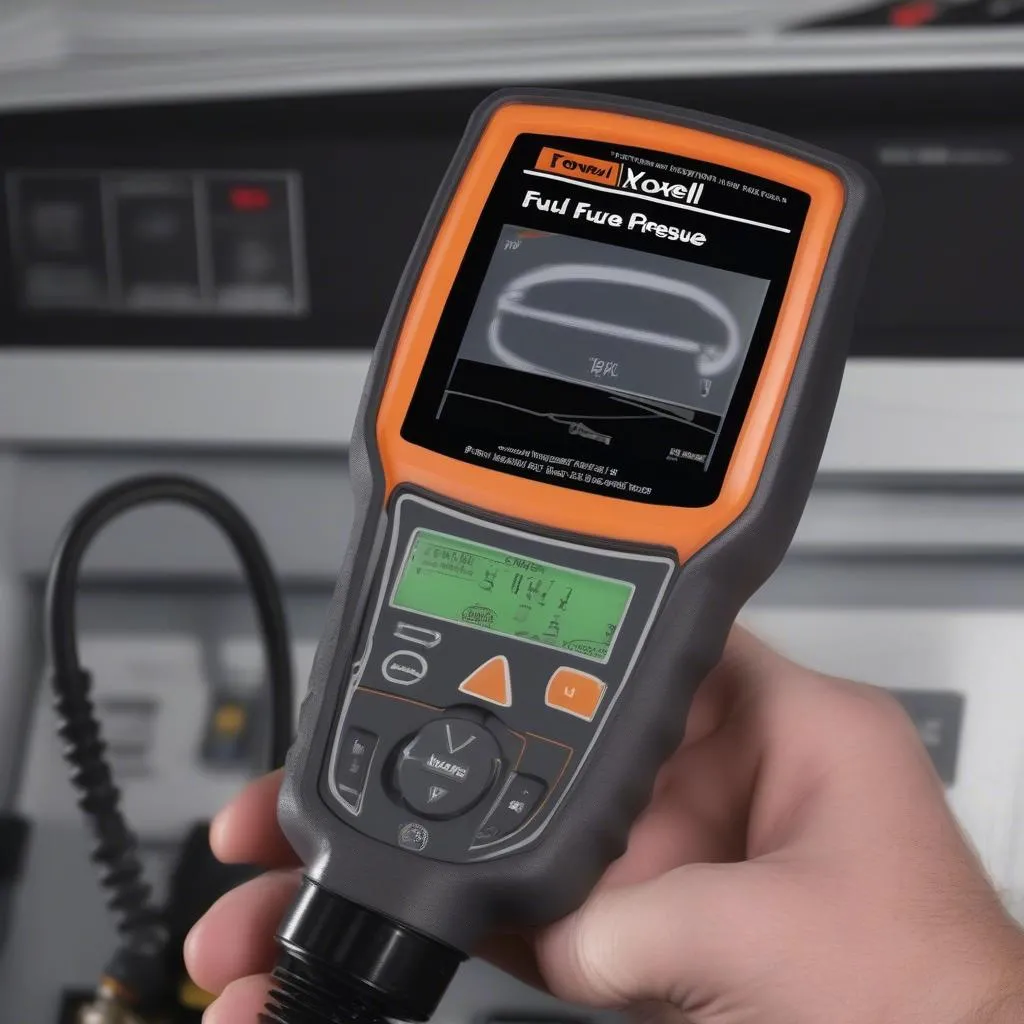Imagine you’re driving down the road, enjoying a scenic route, when your car suddenly sputters and loses power. You pull over, check under the hood, and notice a strange smell. Could it be a fuel pressure issue? If you’re a car enthusiast or even just a curious driver, you’ve probably encountered this question at some point. Today, we’ll dive into the world of fuel pressure diagnostics and how the Foxwell scan tool can be your trusted companion in resolving these automotive mysteries.
Understanding Fuel Pressure and its Importance
What is Fuel Pressure?
Fuel pressure is the force at which gasoline is delivered from the fuel pump to the engine. It’s a critical factor in engine performance, ensuring the right amount of fuel is injected at the right time. Think of it like a pressure gauge in your water system – it ensures the water flows smoothly and efficiently.
Why is Fuel Pressure Important?
Imagine a scenario where your car’s fuel pressure is too low. This can lead to a range of issues like:
- Engine stalling: Insufficient fuel pressure can cause your engine to stall, especially at idle or under acceleration.
- Poor acceleration: Your car might feel sluggish and lack power, especially when you try to accelerate.
- Rough idling: An erratic fuel pressure can cause your engine to idle roughly, resulting in a shaky and uncomfortable ride.
- Increased fuel consumption: Your car might consume more fuel than usual due to inefficient fuel delivery.
How the Foxwell Scan Tool Helps
The Foxwell scan tool, specifically designed for European vehicles, can be a game-changer when it comes to diagnosing fuel pressure issues. It provides access to a wealth of data, including real-time fuel pressure readings. By analyzing this data, you can quickly pinpoint any anomalies and identify the root cause of the problem.
Using the Foxwell Scan Tool to Check Fuel Pressure
Accessing Fuel Pressure Data
- Connect your Foxwell scan tool to your car’s OBD-II port.
- Navigate through the scan tool’s menus to the “Fuel Pressure” or “Engine” section.
- Select the option for “Live Data” or “Data Stream.”
- Locate the “Fuel Pressure” parameter within the data stream.
Interpreting the Data
The Foxwell scan tool displays the fuel pressure reading in units like PSI (pounds per square inch) or kPa (kilopascals). Compare this reading to your car’s manufacturer’s specifications. For example, a common range for fuel pressure in modern cars is 35-50 PSI.
 Foxwell scan tool displaying fuel pressure readings
Foxwell scan tool displaying fuel pressure readings
Troubleshooting Fuel Pressure Issues
Here’s a breakdown of common fuel pressure problems and how you can use the Foxwell scan tool to help:
-
Low fuel pressure: This could indicate a faulty fuel pump, clogged fuel filter, or a leak in the fuel lines. The Foxwell scan tool can help you verify the actual fuel pressure and identify the specific component causing the issue.
-
High fuel pressure: This could be caused by a malfunctioning fuel pressure regulator, a clogged fuel filter, or a leak in the fuel lines. The Foxwell scan tool can help you pinpoint the problem by comparing the actual fuel pressure to the manufacturer’s specifications.
Additional Resources and FAQs
Where Can I Find More Information?
- Foxwell’s website: https://diagxcar.com/professional-diagnostic-scan-tool/
- Automotive repair forums: Search for online forums like “Car Talk” or “AutoZone” for discussions on fuel pressure issues.
- Your car’s owner’s manual: Your owner’s manual may have specific instructions for checking fuel pressure and other related information.
Frequently Asked Questions:
- What are the common causes of fuel pressure problems? Faulty fuel pump, clogged fuel filter, fuel pressure regulator problems, leaks in fuel lines, or even issues with the fuel injectors themselves.
- How do I know if my fuel pressure is too low or too high? Use a scan tool, such as the Foxwell scan tool, to check the actual fuel pressure readings and compare them to the manufacturer’s specifications.
- Can I fix fuel pressure problems myself? Some basic issues like replacing a fuel filter can be done at home. However, more complex problems require professional assistance.
Contact Us for Expert Assistance
Need help interpreting scan tool data or troubleshooting fuel pressure issues? Don’t hesitate to reach out to us via WhatsApp at +84767531508. Our team of certified automotive technicians is available 24/7 to provide guidance and support.
Let’s get your car back on the road and keep those engines purring!


